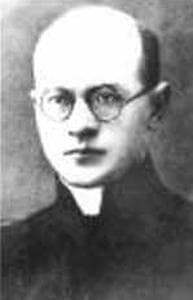
Blessed Zygmunt Pisarski
Blessed
Feast Day: January 30
Birth: April 24, 1902
Death: January 1, 30
Biography
Blessed Zygmunt Pisarski, also known as Segismundo Pisarski or Sigismondo Pisarski, was a devout Catholic priest born on 24 April 1902 in Krasnystaw, Lubelskie, Poland. He belonged to the archdiocese of Lublin and served as a priest in a parish that staunchly refused to renounce Christianity during the tumultuous period of World War II.
Father Zygmunt's parish had been targeted and oppressed by the Communist regime before the arrival of the Nazis. When the Gestapo took control, they sought to find and eliminate the Communists responsible for the persecution. However, Zygmunt, aware of the dire consequences that awaited the accused if they were revealed, steadfastly refused to provide any information to the Gestapo.
Due to his refusal, Father Zygmunt was arrested and subjected to brutal beatings by the Gestapo. His unwavering determination to protect the lives of others is a testament to his incredible courage and selflessness. He opted to sacrifice his own well-being rather than betray those who sought refuge within his parish.
Tragically, on 30 January 1943, Blessed Zygmunt Pisarski was executed by gunfire next to his beloved parish church in Gdeszyn, Poland. Despite the circumstances of his death, he clung tightly to a rosary in his hand, a symbol of his unyielding faith and devotion to God. Zygmunt's ultimate sacrifice and martyrdom exemplify the highest virtues of the Catholic faith.
Recognizing his virtuous life and martyrdom, Pope John Paul II declared Zygmunt venerable on 26 March 1999, granting him the title of "Blessed." The Pope further affirmed his holiness by beatifying Father Zygmunt Pisarski on 13 June 1999. This act acknowledged the priest's extraordinary faith and his significant contribution to the Catholic Church.
Blessed Zygmunt Pisarski serves as a source of inspiration for Catholics around the world, reminding us of the importance of standing up for our beliefs, even in the face of grave adversity. His unwavering commitment to the principles of Christianity and his selfless sacrifice make him a true role model of faith and courage. We venerate him every year on 30 January, as well as on 12 June, alongside the other 108 Martyrs of World War II.